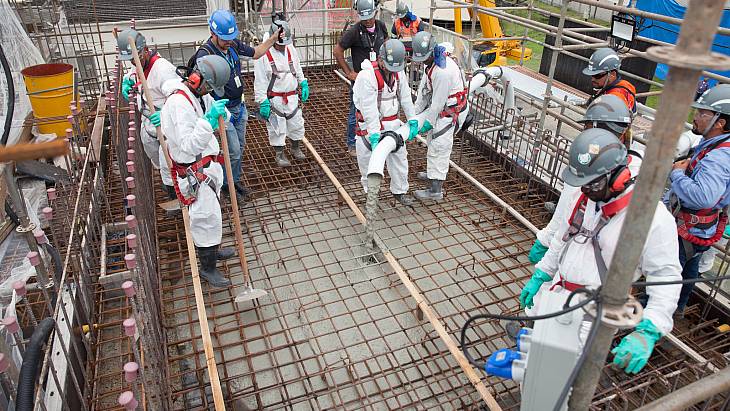Work resumes at Angra 3 after seven years
Eletronuclear said concreting has resumed at Brazil's Angra dos Reis nuclear power plant, marking a restart to the construction of the reactor, which was most recently halted in 2015.

Work resumes on Brazil's third nuclear unit (Image: Eletronuclear)
Preparation for the resumption of concreting began in February with the signing of a contract between Eletronuclear and the Agis consortium of Ferreira Guedes, Matricial and ADtranz. They have since prepared the construction site - including assembling a concrete plant - for the restart of the work.
Laying the first concrete started the Angra 3 Critical Line Acceleration Plan, which aims to complete the civil works of the main buildings including the reactor building. Eletronuclear said that “since September, when the concrete plant was inaugurated, until today, numerous field and laboratory tests have been carried out to guarantee the quality of the material used in construction”.
Eletronuclear’s President Eduardo Grand Court attended the resumption of the concreting, which took place on 11 November at the plant, which is on the coast about 70 miles south of Rio de Janiero.
Brazil currently has two reactors - Angra 1 and Angra 2 - which generate about 3% of the country’s electricity. Work on the Angra 3 project - to feature a Siemens/KWU 1405 MW pressurised water reactor - began in 1984 but was suspended two years later, before construction began. The scheme was resurrected in 2006, with first concrete in 2010. But, amid a corruption probe into government contracts, construction of the unit was halted for a second time in 2015, at the time it was 65% complete. Since the project’s revitalisation, Eletronuclear’s aim has been to start operations by the end of 2026.
Brazil began a process to identify sites for new nuclear power plants earlier this year. The country has historically relied on hydro for as much as 80% of its electricity but changes in rainfall patterns produced droughts which reduced this to 65% by 2018. Brazil’s National Energy Plan to 2050 says the country aims to add 10 GW of nuclear capacity in the next 30 years.
Researched and written by World Nuclear News
- China Institute of Atomic Energy
- Nuclear Power Institute of China
- Southwestern Institute of Physics
- China Nuclear Power Operation Technology Corporation, Ltd.
- China Nuclear Power Engineering Co., Ltd.
- China Institute for Radiation Protection
- Beijing Research Institute of Uranium Geology (BRIUG)
- China Institute of Nuclear Industry Strategy (CINIS)
- China Nuclear Mining Science and Technology Corporation


